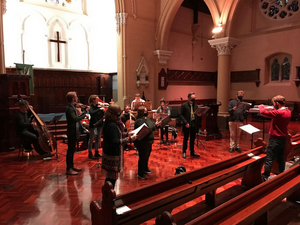 Reviewed by Ewart Shaw, Friday 3rd September 2021.
Reviewed by Ewart Shaw, Friday 3rd September 2021.
Actus Tragicus stands with Oedipus Rex and King Lear in the catalogue of western masterpieces. The establishment of The Cantata Band in Adelaide opens to music lovers the collection of the works of J. S. Bach, the equivalent in music of the plays of Shakespeare. Kim Worley directed his ensemble of baroque instruments in the most capable hands and, in this time of COVID, only four solo voices. In Bach's time, he may, indeed, have performed his cantatas, one voice to a part. Certainly, the coloratura requirements are more easily satisfied by four excellent solo voices. The chosen singers were certainly up to the challenges of Bach's imagination. Alex Roose, bass-baritone, has had a very busy few weeks of concert giving, and his flexible and well-supported sound is fast becoming a noted asset to our musical lives, and it's good to hear Richard Black, tenor, after his return from a long career with the Sydney based Song Company. There's a lovely radiance to Suzanne Pederson's soprano, which showed well in the aria in Cantata BWV 150, and Emma Woehle, a contralto who is about to sing in the Verdi Requiem, balanced excellently well with the other three, and finally had a chance to shine with her solo in the Actus Tragicus.
The two cantatas chosen, BWV 106 and BWV 150, are considered early works, and they don't follow the more usual structure of the major part of the cantata catalogue. Cantata BWV 150, Nach dir, Herr, verlanget mich (Lord I long for you), sings of the trials of life but the final chorus says meine tage in den leiden endet Gott dennoch zur freuden (my days in suffering God will nevertheless end in joy).
There is one solo, for soprano and, unusually, a trio for alto, tenor, and bass about the cedar trees battered by the winds. This cantata is scored for two violins and bassoon with continuo. Ben Dollman and Alison Rayner, violins, and Jackie Newcombe, bassoon, are highly experienced practitioners. It was a joy to hear them.
The second cantata, the better known of the two, is a funeral cantata, BWV 106, the Actus Tragicus. Simply put, it's advice to mortals to put their house in order because they will die and not remain alive. That's the bass solo. The tenor implores God to teach us mortals to consider that we might die, so that we become wise. The chorus of the three lower voices reminds us that it is the ancient law, that we must die. Then the mood lightens a little. The alto commends her spirit to God, and the bass has an arioso of Jesus' words on the cross, today you will be with me in Paradise. The finale chorale and chorus bring comfort, death has become my sleep. The words reflect orthodox Lutheran teaching in a time when life was more precarious than it is now, pandemic included. Worley's tempo for the opening was almost glacially slow, but excellently carried by his musical forces.
One of the most interesting things about this Cantata is the instrumentation. It's believed to predate Bach's arrival at wealthy Leipzig and features two viola da gambas, organ, and violone and, instead of violins, two recorders. In this performance, the viola da gamba players were Graham Strahle and Catherine Finniss, with Robert Nairn, violone, and Andrew Georg, chamber organ. The two recorder players were Jayne Varnish and Lynton Rivers. Forget those prejudices against this particular member of the woodwind family as only a school child's entertainment. In the hands of these two fine artists, the recorders provided eloquent melancholy. Rivers also provided a lively sparkle in a trio sonata from Telemann, TWV 42:F3, with Catherine Finniss, viola da gamba, Tom Marlin, 'cello, and Glenys March, harpsichord. The prelude to the concert was a performance of the Passacaglia in D minor of Buxtehude which gave Andrew Georg the chance to fire up the big instrument in the church.
St John's Lutheran Church in Melbourne, part of the Southbank arts and leisure precinct, has been performing the cantatas according to the Lutheran church calendar that the composer followed. Now, Adelaide has a chance to explore the musical riches available to us.
Anyone who follows my reviews probably knows that I like happy music at times of stress. All this preparation for death, even written by JSB, can induce melancholy in a sensitive soul. Luckily for us, he wrote lots of cantatas, including one in praise of coffee. We have such pleasures to look forward to from the Cantata Band.
Reader Reviews

Videos

